新托福听力加试题
【必备资料】托福听力经典加试-ID Problem(试题及答案)

【必备资料】托福听力经典加试-ID Problem(试题及答案)加试题是一种收集研究数据、测试新研发试题难度及可靠性的手段。
这是保证广大考生获得公平、精确和有效的测试而开展的标准化工作的核心部分。
不仅托福考试,加试题这种形式在很多其他的考试中都广泛存在。
下面为大家整理了托福经典听力加试题希望能为你的托福备考带来帮助。
ID Problem女学生丢了钱包(里面有她的student id& meal card& key等东西),无法回dorm。
于是去student service办id card,遇到staff(口音像是一位黑人大叔)把守,说没有id card 不能进去,要么出示dirving license,要么是有头像照片的本本,比如passport什么的。
但是女生说,我的wallet丢了,id card没了,passport也在dorm里面,而没有id card,dorm不让进(有题目,问她为什么拿不到passport?)后来女说这个问题她和dorm负责人说过,有email 到这里做说明,staff查了查,果然如此,然后staff 又说如果你能正确说出passport 的number,就让她进去,女学生从容的说出了number,他说OK,你可以进去了,但是你会受到监视。
MM说,who cares!MM又说了:她的meal card也掉了。
管理员说:你在里面办ID的时候也可以顺便办了meal card。
MM说:你真的是帮了我很大的忙啊!管理员:if you have some otherproblems, I am glad to help you。
MM, you help!(降调的)à有考到态度题,问MM为什么这么说?(记得两选项:1.MM怀疑这个管理员是不是能帮他。
2.MM在解决了所有的问题之后如释重负。
)托福听力加试题的位置不固定,考生很难分辨哪一道是加试题,只能通过日常积累来判断。
托福听力经典加试(有听力原文)
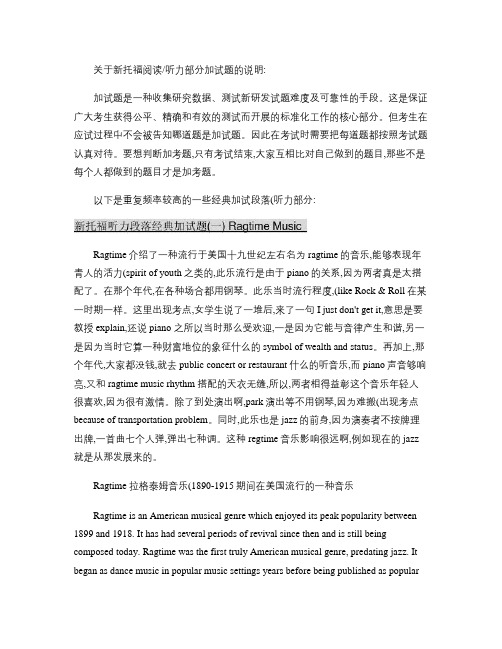
关于新托福阅读/听力部分加试题的说明:加试题是一种收集研究数据、测试新研发试题难度及可靠性的手段。
这是保证广大考生获得公平、精确和有效的测试而开展的标准化工作的核心部分。
但考生在应试过程中不会被告知哪道题是加试题。
因此在考试时需要把每道题都按照考试题认真对待。
要想判断加考题,只有考试结束,大家互相比对自己做到的题目,那些不是每个人都做到的题目才是加考题。
以下是重复频率较高的一些经典加试段落(听力部分:Ragtime介绍了一种流行于美国十九世纪左右名为ragtime的音乐,能够表现年青人的活力(spirit of youth之类的,此乐流行是由于piano的关系,因为两者真是太搭配了。
在那个年代,在各种场合都用钢琴。
此乐当时流行程度,(like Rock & Roll在某一时期一样。
这里出现考点,女学生说了一堆后,来了一句I just don't get it,意思是要教授explain,还说piano 之所以当时那么受欢迎,一是因为它能与音律产生和谐,另一是因为当时它算一种财富地位的象征什么的symbol of wealth and status。
再加上,那个年代,大家都没钱,就去public concert or restaurant什么的听音乐,而piano声音够响亮,又和ragtime music rhythm 搭配的天衣无缝,所以,两者相得益彰这个音乐年轻人很喜欢,因为很有激情。
除了到处演出啊,park演出等不用钢琴,因为难搬(出现考点because of transportation problem。
同时,此乐也是jazz的前身,因为演奏者不按牌理出牌,一首曲七个人弹,弹出七种调。
这种regtime音乐影响很远啊,例如现在的jazz 就是从那发展来的。
Ragtime 拉格泰姆音乐(1890-1915期间在美国流行的一种音乐Ragtime is an American musical genre which enjoyed its peak popularity between 1899 and 1918. It has had several periods of revival since then and is still being composed today. Ragtime was the first truly American musical genre, predating jazz. It began as dance music in popular music settings years before being published as popularsheet music for piano. Being a modification of the then popular march, it was usually written in 2/4 or 4/4 time (meter with a predominant left hand pattern of bass notes on odd-numbered beats and chords on even-numbered beats accompanying a syncopated melody in the right hand. A composition in this style is called a "rag". A rag written in3/4 time is a "ragtime waltz".Ragtime is not a "time" (meter in the same sense that march time is 2/4 meter and waltz time is 3/4 meter; it is rather a musical genre that uses an effect that can be applied to any meter. The defining characteristic of ragtime music is a specific type of syncopation in which melodic accents fall between metrical beats. This results in a melody that seems to be avoiding some metrical beats of the accompaniment by emphasizing notes that either anticipate or follow thebeat. The ultimate (and intended effect on the listener is actually to accentuate the beat, thereby inducing the listener to move to the music. Scott Joplin, thecomposer/pianist known as the "King of Ragtime", called the effect "weird and intoxicating". He also used the term "swing" in describing how to play ragtime music: "Play slowly until you catch the swing...".[1] The name swing later came to be applied to an early genre of jazz that developed from ragtime. Converting a non-ragtime piece of music into ragtime by changing the time values of melody notes is known as "ragging" the piece. Original ragtime pieces usually contain several distinct themes, four being the most common number.literature 主要讲了18-19 世纪英国浪漫主义(Romanticism诗歌的代表人Wardsworth的诗。
托福听力经典加试
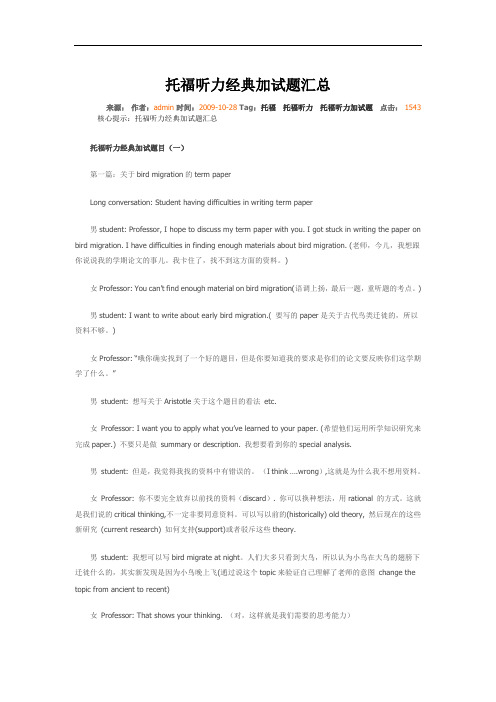
托福听力经典加试题汇总来源:作者:admin 时间:2009-10-28 Tag:托福托福听力托福听力加试题点击: 1543 核心提示:托福听力经典加试题汇总托福听力经典加试题目(一)第一篇:关于bird migration的term paperLong conversation: Student having difficulties in writing term paper男student: Professor, I hope to discuss my term paper with you. I got stuck in writing the paper on bird migration. I have difficulties in finding enough materials about bird migration. (老师,今儿,我想跟你说说我的学期论文的事儿。
我卡住了,找不到这方面的资料。
)女Professor: You can’t find enough material on bird migration(语调上扬,最后一题,重听题的考点。
)男student: I want to write about early bird migration.( 要写的paper是关于古代鸟类迁徙的,所以资料不够。
)女Professor: “哦你确实找到了一个好的题目,但是你要知道我的要求是你们的论文要反映你们这学期学了什么。
”男student: 想写关于Aristotle关于这个题目的看法etc.女Professor: I want you to apply what you’ve learn ed to your paper. (希望他们运用所学知识研究来完成paper.) 不要只是做summary or description. 我想要看到你的special analysis.男student: 但是,我觉得我找的资料中有错误的。
新托福听力经典加试
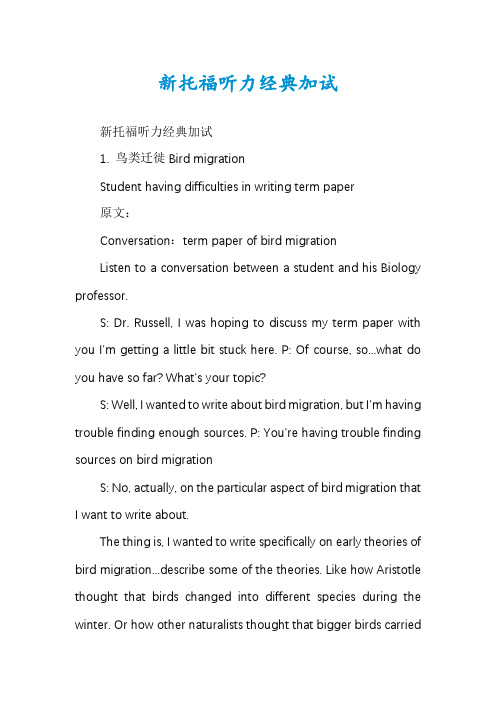
新托福听力经典加试新托福听力经典加试1. 鸟类迁徙Bird migrationStudent having difficulties in writing term paper原文:Conversation:term paper of bird migrationListen to a conversation between a student and his Biology professor.S: Dr. Russell, I was hoping to discuss my term paper with you I'm getting a little bit stuck here. P: Of course, so...what do you have so far? What's your topic?S: Well, I wanted to write about bird migration, but I'm having trouble finding enough sources. P: You're having trouble finding sources on bird migrationS: No, actually, on the particular aspect of bird migration that I want to write about.The thing is, I wanted to write specifically on early theories of bird migration...describe some of the theories. Like how Aristotle thought that birds changed into different species during the winter. Or how other naturalists thought that bigger birds carriedsmaller birds to warmer spots for the wintertime. But I've only got a couple of books to work with right now.P: Hm...I have to admit that it's an interesting topic, and you certainly seem excited by it. But remember I told you all to ask yourselves how your topic is going to help you show that you can apply what you've learned this semester. A summary or description is not really what I'm looking for as much as your analysis of a certain topic.S: I guess it's not really what we're supposed to do, huhP: Right. So, how about we think about some other ideas for your paper. I mean you don't need to discard the idea completely... but... take a really different focus. Um... for example...you could present what you think are some reasons-the rationale-behind some of the erroneous theories early naturalists had. But, you'll be supporting your views with current research; those are the sources you'll need to seek out.S: Ok, I think I see what you're saying. So, like today...today we know that lots of small birds migrate at night, but maybe `cause people didn't see them-didn't see the small birds migrating-they only saw bigger birds, like geese migrating during the day. They thought that the big birds were carrying thesmall ones under their wings.P: There you go! That's exactly what I mean. You're showing that you're thinking about the topic, not just telling me what you read.S: Ok, I see your point.P: But it's great that you're finding this all so interesting. I want you to come back to see me in a week so we can take a look at the new direction in your paper and evaluate the sources you've found in the meantime.中文大意:Male Student:老师,我想跟你讨论一下我的学期论文。
新托福听力经典加试全解析(共两套)

新托福听力经典加试全解析(共两套)新托福听力经典加试全解析Section 1一、conversation鸟类迁徙1. Why does the man go to see his professor?(A) He wants to change his paper topic.(B) He doesn`t understand how to analyze bird migration.(C) He cannot find enough information on his term paper topic.(D) He doesn`t understand the ideas that he has been reading about.【解析】对话开头部分,学生说:I`m having trouble finding enough sources;But I`ve only got a couple of books to work with right now.2. How does the professor help the man?(A) By suggesting a change in his approach to a paper(B) By explaining some theories about bird migration to him(C) By providing some additional examples he can use on the topic he chose(D) By giving him direction on where to find sources【解析】老师说:“you don`t need to discard the idea completely…but…take a really different focus.”3. What information will the man probably include in his paper?(A) Description of the migration habits of the Common Poorwill(B) His own analysis of early theories about bird migration(C) A comparison between birds that migrate and birds that do not(D) Current research on bird migration【解析】原文对应B:you could present what you think are some reasons;D:you`ll be supporting your views with current research4. Why does the man talk about birds that migrate at night?(A) To determinate that he understands the professor`s recommendation(B) To give examples of what he wants the professor to explain(C) To give an alternative explanation of the hibernation of the Common Poorwill(D) T o ask whether he should change his topic to the sleeping behavior of birds【解析】学生说:I think I see what you`re saying. So…Listen again to part of the conversation and then answer the question.You`re having trouble finding sources on bird migration5. What does the professor imply when she says this:(A) She`s not sure the man should write about bird migration.(B) She thinks finding sources on bird migration should be easy.(C) She`s not sure that she can help the man.(D) She thinks that man has already found enough sources on bird migration.【解析】老师的语气是反问的,她认为查找资料并不困难。
托福考试经典加试听力题目
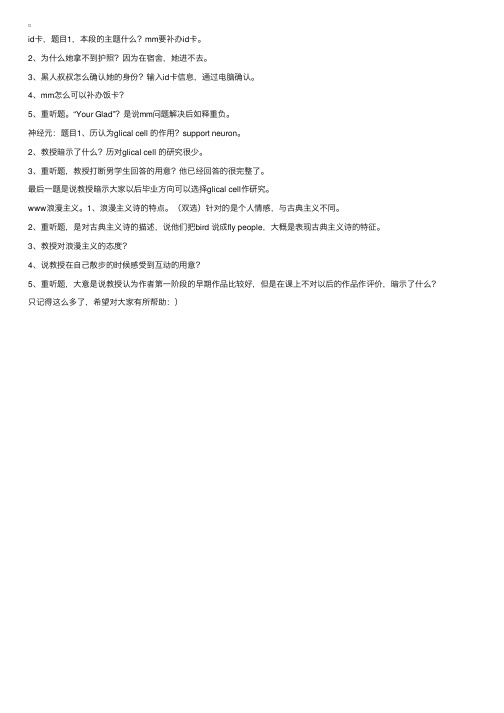
id卡,题⽬1,本段的主题什么?mm要补办id卡。
2、为什么她拿不到护照?因为在宿舍,她进不去。
3、⿊⼈叔叔怎么确认她的⾝份?输⼊id卡信息,通过电脑确认。
4、mm怎么可以补办饭卡?
5、重听题。
“Your Glad”?是说mm问题解决后如释重负。
神经元:题⽬1、历认为glical cell 的作⽤?support neuron。
2、教授暗⽰了什么?历对glical cell 的研究很少。
3、重听题,教授打断男学⽣回答的⽤意?他已经回答的很完整了。
最后⼀题是说教授暗⽰⼤家以后毕业⽅向可以选择glical cell作研究。
www浪漫主义。
1、浪漫主义诗的特点。
(双选)针对的是个⼈情感,与古典主义不同。
2、重听题,是对古典主义诗的描述,说他们把bird 说成fly people,⼤概是表现古典主义诗的特征。
3、教授对浪漫主义的态度?
4、说教授在⾃⼰散步的时候感受到互动的⽤意?
5、重听题,⼤意是说教授认为作者第⼀阶段的早期作品⽐较好,但是在课上不对以后的作品作评价,暗⽰了什么?只记得这么多了,希望对⼤家有所帮助:)。
新托福听力加试题

新托福听力加试题新托福听力加试题1.ID CardListen to a conversation between a student and a staff in University Service office. Female student: 我想办新卡,因为旧的丢了。
Male staff: 因为学校的registration 还未结束,所以我这里没有你的完整资料,如果你需要办卡,得提供证件来证明身份,比如说你的驾照。
Female student: 我的驾照在钱包里,钱包被偷了。
Male staff: 那么护照呢?Female student: 护照在宿舍里,因为丢了ID Card, 我没办法进宿舍,所以我才来这办新卡。
Male staff:让我发封mail, 看看怎么办这事。
(several seconds later)好了,你现在可以去宿舍取护照了,但是必须身边有人看着你(escort you).Female student: Who cares! 还有,我的饭卡也丢了,怎么办?Male staff: 没关系,在申办新的ID card 的时候,顺便把meal card 也可以办了。
Female student: Thanks a lot.Male staff: you are welcome, I am very glad to help you.Female student: en… you are glad!题目:1.Why does the student go to see the officeworker in the university service office? Answer: (D) 学生要办新卡2.Why can not the student show her driverlicense either?Answer: (B) 放在宿舍,没有ID 进不去。
3.Why she needs to be escorted?Answer: (C) 确认她的身份,输入ID card 信息,通过电脑确认。
托福听力加试完整版
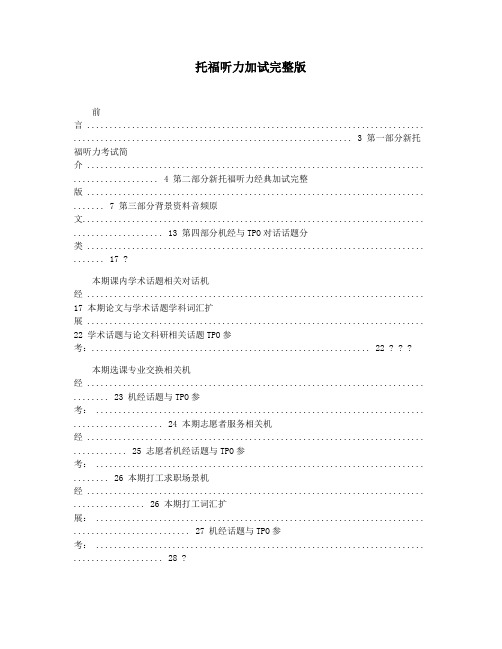
托福听力加试完整版前言 ........................................................................... .............................................................. 3 第一部分新托福听力考试简介 ........................................................................... ................... 4 第二部分新托福听力经典加试完整版 ........................................................................... ....... 7 第三部分背景资料音频原文............................................................................ .................... 13 第四部分机经与TPO对话话题分类 ........................................................................... ....... 17 ?本期课内学术话题相关对话机经 ...........................................................................17 本期论文与学术话题学科词汇扩展 ...........................................................................22 学术话题与论文科研相关话题TPO参考:.............................................................. 22 ? ? ?本期选课专业交换相关机经 ........................................................................... ........ 23 机经话题与TPO参考: ......................................................................... .................... 24 本期志愿者服务相关机经 ........................................................................... ............ 25 志愿者机经话题与TPO参考: ......................................................................... ........ 26 本期打工求职场景机经 ........................................................................... ................ 26 本期打工词汇扩展: ......................................................................... .......................... 27 机经话题与TPO参考: ......................................................................... .................... 28 ?本期社团生活相关机经 ........................................................................... ................ 28 学科词汇扩展 ........................................................................... .................................... 29 机经话题与TPO参考: ......................................................................... .................... 30 ? ? ?本期其它话题机经 ........................................................................... ........................ 30 重点推荐TPO话题补充 ........................................................................... ............. 34 社会科学类相关机经 ........................................................................... .................... 36 考古学人类学 ........................................................................... .................................... 36 社会科学类TPO参考: ......................................................................... .................... 39 本期历史哲学相关机经 ........................................................................... .................... 39 哲学学科词汇:Philosophy ................................................................... .................... 40 哲学类TPO参考: ......................................................................... ............................ 40 商业政治经济相关机经 ........................................................................... .................... 40 经济学Economics商业Business相关词汇 ............................................................ 41 经济学政治类TPO参考: ......................................................................... ................ 43 ? ?艺术类相关话题机经 ........................................................................... .................... 43 心里学语言学社会学相关话题机经 (43)心理学:Psychology相关词汇 ........................................................................... ....... 45 心理学语言学社会学TPO参.... 47 ?艺术类相关话题机经 ........................................................................... .................... 47 本期文学戏剧相关 ........................................................................... ............................ 47 本期文学戏剧类TPO参考: ......................................................................... ............ 48 本期音乐舞蹈相关 ........................................................................... ............................ 48 本期音乐类词汇拓展:Music ........................................................................ ............ 48 本期音乐类TPO参考: ......................................................................... .................... 49 本期电影摄影相关 ........................................................................... . (49)第五部分机经与TPO讲座话题分类 ........................................................................... . (36)1本期电影类词汇拓展 ........................................................................... ........................ 50 本期美术工艺建筑相关 ........................................................................... .................... 50 本期美术类词汇拓展 ........................................................................... ........................ 53 本期美术类TPO参考: ......................................................................... .................... 54 ?自然科学类相关机经 ........................................................................... .................... 55 天文................................................ 55 天文Astronomy类词汇拓展 ........................................................................... ........... 59 天文学类TPO参考: ......................................................................... ........................ 61 地理地质 ........................................................................... ............................................ 61 地理类学科词汇拓展 ........................................................................... ........................ 64 地理类TPO参考: ......................................................................... ............................ 66 物理化学 ........................................................................... ............................................ 66 物理词汇拓展:Physics ...................................................................... ........................ 68 物理化学TPO参考: ......................................................................... ........................ 69 环境科学 ........................................................................... ............................................ 70 环境科学TPO参考: ......................................................................... ........................ 71 ?生命科学类相关机经 ........................................................................... .................... 72 本期动物类 ........................................................................... ........................................ 72 本期动物类重点动物名称 ........................................................................... ................ 75 本期植物学相关 ........................................................................... ................................ 79 本期植物学相关词汇拓展 ........................................................................... ................ 79 本期植物学TPO参考: ......................................................................... .................... 80 本期生态学 ........................................................................... ........................................ 80 本期生态学TPO参考: ......................................................................... .................... 81 本期环境科学/生态学词汇拓...... 81 本期生物学词汇: ......................................................................... .............................. 84 第六部分:考前规划!!! ..................................................................... (85)2前言听力机经是用来创造相对剩余价值的,通过机经梳理在考前更有针对性的提高语言能力是本讲义的宗旨!本讲义使用方法:1,灵活掌握机经内容,请勿机械的背诵机经原文。
新托福听力加试题最新整理附答案
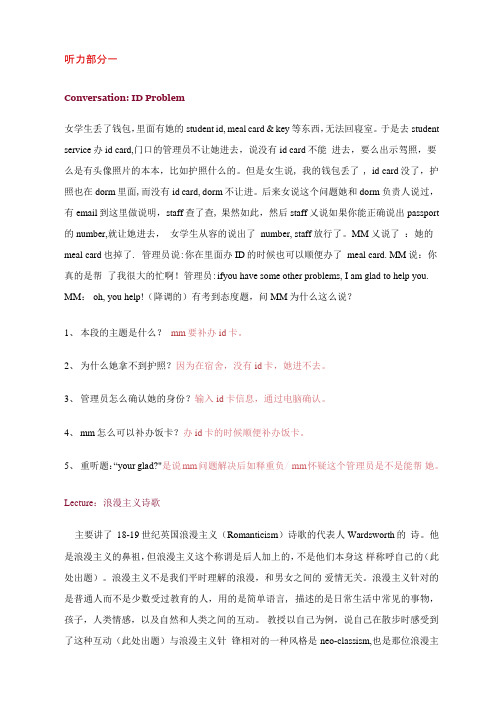
听力部分一Conversation: ID Problem女学生丢了钱包,里面有她的student id, meal card & key等东西,无法回寝室。
于是去student service办id card,门口的管理员不让她进去,说没有id card不能进去,要么出示驾照,要么是有头像照片的本本,比如护照什么的。
但是女生说, 我的钱包丢了 , id card没了,护照也在dorm里面,而没有id card, dorm不让进。
后来女说这个问题她和dorm负责人说过,有email到这里做说明,staff查了查, 果然如此,然后staff 乂说如果你能正确说出passport 的number,就让她进去,女学生从容的说出了number, staff放行了。
MM 乂说了:她的meal card也掉了. 管理员说:你在里面办ID的时候也可以顺便办了meal card. MM说:你真的是帮了我很大的忙啊!管理员:ifyou have some other problems, I am glad to help you. MM: oh, you help!(降调的)有考到态度题,问MM为什么这么说?1、本段的主题是什么?mm要补办id卡。
2、为什么她拿不到护照?因为在宿舍,没有id卡,她进不去。
3、管理员怎么确认她的身份?输入id卡信息,通过电脑确认。
4、mm怎么可以补办饭卡?办id卡的时候顺便补办饭卡。
5、重听题:“your glad?"是说mm问题解决后如释重负/ mm怀疑这个管理员是不是能帮她。
Lecture:浪漫主义诗歌主要讲了18-19世纪英国浪漫主义(Romanticism)诗歌的代表人Wardsworth的诗。
他是浪漫主义的鼻祖,但浪漫主义这个称谓是后人加上的,不是他们本身这样称呼自己的(此处出题)。
浪漫主义不是我们平时理解的浪漫,和男女之间的爱情无关。
浪漫主义针对的是普通人而不是少数受过教育的人,用的是简单语言, 描述的是日常生活中常见的事物,孩子,人类情感,以及自然和人类之间的互动。
新托福iBT听力经典加试浪漫主义诗歌试题及答案

新托福iBT听力经典加试:浪漫主义诗歌(试题及答案)英国浪漫主义诗人华兹华斯及其诗歌18-19 世纪英国浪漫主义(Romanticism) 诗歌的鼻祖华兹华斯Wordsworth 的诗歌。
浪漫主义这个称谓是后人加上的,不是浪漫主义诗人对自己的称呼(此处有题)。
浪漫主义Romanticism 不是我们平时理解的浪漫romance/romantic,和男女之间的爱情无关。
Romanticism针对的是普通人common people 而不是少数受过教育的人educated people。
浪漫主义诗人用简单的语言simple language 描述日常生活中常见的事物、孩子、人类情感以及自然和人类之间的互动(有题:浪漫主义诗的特点。
(双选)针对的是个人情感,与古典主义不同。
)。
教授以自己为例,说自己在散步时感受到了这种互动(此处出题)与romanticism 针锋相对的一种风格是neo-classism(新古典主义),也是那位romanticism 的鼻祖很反对的。
Neo-classism(新古典主义) 使用太多的elaboration,如sky 不叫sky,而叫blue extend;bird 不叫bird,而叫feathered person。
(有题:重听题,是对古典主义诗的描述,说他们把bird 说成fly people,大概是表现古典主义诗的特征。
)教授把该诗人的作品分为三个阶段。
早期的浪漫主义作品,主要描述植物的(花与草)诗歌。
中期时是对一些社会现象做的尖锐评论。
后期时对早期的作品进行修改review。
目前,文学界还是认为它早期的作品是最好的。
教授还说,他的诗越写到后来就越写越糟糕,反而早期的比较好,本文重点讲了他第一阶段的诗)重听题,大意是说教授认为作者第一阶段的早期作品比较好,但是在课上不对以后的作品作评价,暗示了什么?本文重点讲了他第一阶段的诗。
)补充资料:ROMANTICISMRomanticism is a style in the fine arts and literature. It emphasizes passion rather than reason, and imagination and intuition rather than logic. Romanticism favors full expression of the emotions, and free, spontaneous action rather than restraint and order.Romanticism can be seen as a rejection of the precepts of order, calm, harmony, balance, idealization, and rationality that typified Classicism in general and late 18th-century Neoclassicism in particular.It was also to some extent a reaction against the Enlightenment and against 18th-century rationalism and physical materialism in general. Romanticism emphasized the individual, the subjective, the irrational, the imaginative, the personal, the spontaneous, the emotional, the visionary, and the transcendental.Romanticism in literature. During the Romantic Movement, most writers were discontented with their world. It seemed commercial, inhuman, and standardized. To escape from modern life,the Romantics turned their interest to remote and faraway places, the medieval past, folklore and legends, and nature and the common people. The Romantics were also drawn to the supernatural.WORDSWORTHWordsworth, William (1770-1850), is considered by many scholars to be the most important English Romantic poet. In 1795, Wordsworth met Samuel Taylor Coleridge. The two men collaborated on Lyrical Ballads (1798), a collection of poems frequently regarded as the symbolic beginning of the English Romantic movement.Wordsworth argued that serious poems could describe "situations from common life" and be written in the ordinary language "really used by men." He believed such poems could clarify "the primary laws of our nature." Wordsworth also insisted that poetry is "emotion recollected in tranquility."He explained that his poetry used everyday language rather than the elevated poetic language of such earlier writers as Dryden and Pope because everyday language comes closer to expressing genuine human feeling. For the same reason, he wanted to write about everyday topics, especially rural, unsophisticated subjects.Wordsworth and Coleridge lived most of their lives in the scenic Lake District of northwestern England and wrote expressively about the beauties of nature and the thoughts that natural beauty inspires. Many of their blank verse poems are written in a meditative, conversational tone new to English poetry.Wordsworth, as we have said, is the chief representative典型的of some of the most important principles原则in the romantic movement, but he is far more a member of any movement, through his supreme poetic expression of some of the greatest spiritual ideals he belongs among the five or six greatest English poets.First, he is the profoundest interpreter of nature in all poetry. His feeling for nature has two aspects. he is keenly sensitive, and in a more delicately discriminating way than any of his predecessors, to all the external beauty and glory of nature, especially inanimate nature of mountains, woods and fields, streams and flowers, in all their infinitely varied aspects. A wonderful joyous and intimate sympathy with them is one of his controlling impulses.In the second place, Wordsworth is the most consistent of all the great English poets of democracy, though here as elsewhere his interest is mainly not t in the external but in the spiritual aspect of things.The obstinacy and these poems are only the most conspicuous result of Wordsworth chief temperamental defect, which was an almost total lack of the sense of humor. Regarding himself as the prophet of a supremely important new gospel, he never admitted the possibility of error in his own point of view and was never able to stand aside from his poetry and criticize itdispassionately.题目:问题一:浪漫主义诗的特点。
新托福加试(听力、阅读)大全——含答案及背景

新托福加试(听力/阅读)大全——内含答案及背景浪漫主义诗歌机经原文:本文讲18-19世纪英国浪漫主义诗歌的特点。
威廉·华兹华斯(William Wordsworth)是浪漫主义诗歌的鼻祖。
但是,开始时,他们并没有称这种诗歌形式为浪漫主义,浪漫主义诗人这个称谓是他们的后人为他们加上的。
浪漫主义中的浪漫并不是我们平时所理解的“浪漫”,这里的“浪漫”与男女之间的爱情无关。
浪漫主义诗歌针对的是普通大众,而不是少数受过教育的人。
浪漫主义诗歌用的是简单语言,描述的是日常生活中常见的事物,比如孩子、人与人之间的情感、以及自然和人类之间的互动。
教授说,我自己在散步时感受到了这种所谓的自然与人类之间的互动。
与浪漫主义针锋相对的一种风格是新古典主义(neo-classicism),浪漫主义的鼻祖——威廉·华兹华斯很反对新古典主义。
新古典主义诗歌中使用了太多的详尽细节(elaboration)。
比如,在新古典主义诗歌中:天空(sky)不叫天空,而是叫了蓝色(blue);鸟(bird)不叫鸟,而叫羽人(feathered person)。
威廉·华兹华斯的作品分为3个阶段。
1.早期的浪漫主义作品,主要描述植物的(花与草)诗歌。
2.中期的浪漫主义作品,主要是对一些社会现象的评论。
3.后期的浪漫主义作品,主要是对早期的作品进行修改。
目前文学界还是认为他早期的作品是最好的。
教授认为他的诗越写到后来就越糟糕,反而早期的比较好。
但是在课堂上,我就不对中厚期的作品作评价了。
真题重现:(1)问:浪漫主义诗人的称谓是怎么来的?答:浪漫主义诗人这个称谓是后人为他们加上的,不是他们本身这样称呼自己的。
(2)问:演讲中为何提到了教授散步?答:为了说明自然与人类之间的互动。
(3)问:(双选)浪漫主义诗的特点是什么?答:1.针对的是个人情感;2.与古典主义不同。
(4)问:(重听题)教授说“在课堂上,我就不对中厚期的作品作评价了”暗示了什么?答:演讲中重点介绍威廉·华兹华斯的早期作品。
托福听力经典加试题汇总
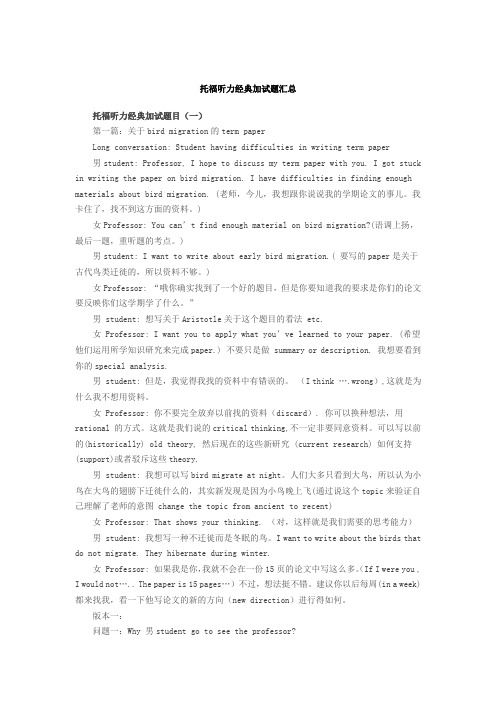
托福听力经典加试题汇总托福听力经典加试题目(一)第一篇:关于bird migration的term paperLong conversation: Student having difficulties in writing term paper男student: Professor, I hope to discuss my term paper with you. I got stuck in writing the paper on bird migration. I have difficulties in finding enough materials about bird migration. (老师,今儿,我想跟你说说我的学期论文的事儿。
我卡住了,找不到这方面的资料。
)女Professor: You can’t find enough material on bird migration?(语调上扬,最后一题,重听题的考点。
)男student: I want to write about early bird migration.( 要写的paper是关于古代鸟类迁徙的,所以资料不够。
)女Professor: “哦你确实找到了一个好的题目,但是你要知道我的要求是你们的论文要反映你们这学期学了什么。
”男 student: 想写关于Aristotle关于这个题目的看法 etc.女 Professor: I want you to apply what you’ve learned to your paper. (希望他们运用所学知识研究来完成paper.) 不要只是做 summary or description. 我想要看到你的special analysis.男 student: 但是,我觉得我找的资料中有错误的。
(I think ….wrong),这就是为什么我不想用资料。
女 Professor: 你不要完全放弃以前找的资料(discard). 你可以换种想法,用rational 的方式。
【必备资料】托福听力经典加试-咖啡包装
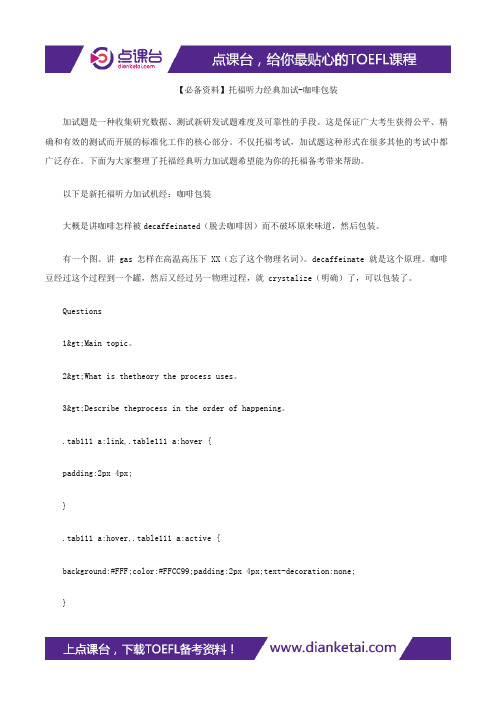
【必备资料】托福听力经典加试-咖啡包装加试题是一种收集研究数据、测试新研发试题难度及可靠性的手段。
这是保证广大考生获得公平、精确和有效的测试而开展的标准化工作的核心部分。
不仅托福考试,加试题这种形式在很多其他的考试中都广泛存在。
下面为大家整理了托福经典听力加试题希望能为你的托福备考带来帮助。
以下是新托福听力加试机经:咖啡包装大概是讲咖啡怎样被decaffeinated(脱去咖啡因)而不破坏原来味道,然后包装。
有一个图。
讲 gas 怎样在高温高压下 XX(忘了这个物理名词)。
decaffeinate 就是这个原理。
咖啡豆经过这个过程到一个罐,然后又经过另一物理过程,就 crystalize(明确)了,可以包装了。
Questions1>Main topic。
2>What is thetheory the process uses。
3>Describe theprocess in the order of happening。
.tab111 a:link,.table111 a:hover {padding:2px 4px;}.tab111 a:hover,.table111 a:active {background:#FFF;color:#FFCC99;padding:2px 4px;text-decoration:none;}.tab111 {font-family: 微软雅黑;}.tab111 a { color:#FFF;font-weight:bold;text-align:center; }。
- 1、下载文档前请自行甄别文档内容的完整性,平台不提供额外的编辑、内容补充、找答案等附加服务。
- 2、"仅部分预览"的文档,不可在线预览部分如存在完整性等问题,可反馈申请退款(可完整预览的文档不适用该条件!)。
- 3、如文档侵犯您的权益,请联系客服反馈,我们会尽快为您处理(人工客服工作时间:9:00-18:30)。
新托福听力加试题1.ID CardListen to a conversation between a student and a staff in University Service office. Female student: 我想办新卡,因为旧的丢了。
Male staff: 因为学校的registration 还未结束,所以我这里没有你的完整资料,如果你需要办卡,得提供证件来证明身份,比如说你的驾照。
Female student: 我的驾照在钱包里,钱包被偷了。
Male staff: 那么护照呢?Female student: 护照在宿舍里,因为丢了ID Card, 我没办法进宿舍,所以我才来这办新卡。
Male staff:让我发封mail, 看看怎么办这事。
(several seconds later)好了,你现在可以去宿舍取护照了,但是必须身边有人看着你(escort you).Female student: Who cares! 还有,我的饭卡也丢了,怎么办?Male staff: 没关系,在申办新的ID card 的时候,顺便把meal card 也可以办了。
Female student: Thanks a lot.Male staff: you are welcome, I am very glad to help you.Female student: en… you are glad!题目:1.Why does the student go to see the officeworker in the university service office? Answer: (D) 学生要办新卡2.Why can not the student show her driverlicense either?Answer: (B) 放在宿舍,没有ID 进不去。
3.Why she needs to be escorted?Answer: (C) 确认她的身份,输入ID card 信息,通过电脑确认。
4.How can the student get a new meal card? Answer: (D) 和ID 一起补办。
5.Listen again: Female student: you are glad. Answer: (D) she was relieved.2.Glial Cell(神经元细胞)Lecture:Glial cells, commonly called neuralgia or simply glial (Greek for ―glue‖, researches originally believed that glial cells served as the putty that held the neurons together, recent research indicated that these cells provide very important contributions.) , are non-neuronal cells. In the human brain, glial are estimated to outnumber neurons by about 10 to 1.Glial cells provide support and protection for neurons, the other main type of cell in the central nervous system. The four main functions of glial cells are to surround neurons and hold them in place, to supply nutrients and oxygen to neurons, to insulate one neuron from another, and to destroy pathogens and remove dad neurons. Traditionally glial had been thought to lack certain features of neurons. For example, glial were not believed to have chemical neurotransmitters. They were considered tobe the passive bystanders of neural transmission.However, recent studies disproved this. It is inappropriate nowadays to consider glial as ―glue‖in the nervous system as the name implies but more of a partner to neurons. They are also crucial in the development of the nervous system.中文大意:好,在今天开始讲课之前,我们先review上节课的内容。
上节课,我们讲了神经元细胞(计算机屏幕:Neutron),以及其工作原理(function), 有谁能想起来?Male student(Bernard): Neutron 是指在大脑运作的过程中起作用的一种细胞(cell), 它接收electronic signal, 经过传递,然后在送往大脑的接收器(receptor).Female professor 忽然打断(replay): 好的。
Bernard, 可以了。
你的答案很complete. 那么今天,我们来讲一下glial cell (glial cell on the little screen), 这也是大脑物质中的一种。
历史上,生物学家们不重视glial cell, 对神经传导的研究仅限于神经元(neutron), 或者叫nerve cell. 神经传导通过electrical communication 从一个结点传到另一个节点,神经元被认为起着重要的作用。
Glial cell 被研究的很少,一直被忽略,被看做是help the growth of neurons, 起辅助作用(support neutron), 例如,protect, repair the damaged neutron cell. 后来,偶然发现大脑中glial cell 比neutron 的数目多很多,这才引起了科学家的重视,开始研究他究竟起什么作用。
(有问题:Glial cell 怎么引起科学家注意的)人们发现胶质细胞也有传导信息的作用,不过不是通过生物电(not electronically communication), 而是化学物质传导(but chemical communication). 传统观点一直误以为glial cell 也像nerve cell 一样用电信号。
Glail cell 总共有三种传导方式,神经细胞间,胶质细胞间,神经和胶质细胞互相传导。
而且glial cell 的功能也绝不像传统上认为的那样只是send signal.那么到底glial cell 的功能有可能是什么呢?我们在用脑子的时候,其实就是在用glail cell.比如说,我们feel, think and remember 的时候。
所以,人们就有个假设(hypothesis), 可能智商(IQ)和glial cell 有关系,glial cell 越多,智商就越高,但这事不确定。
对角质细胞的研究将是一个很open up 的领域,因为目前我们对它的认识十分有限,但相关研究已经开始流行,而且到了大家毕业之后的几年中可能成为炙手可热的研究课题。
Female student : 老师,你的意思是说,以后glail cell 这个领域会很值得研究了?。
将来我们毕业的时候也可以。
(被打断)Female professor: 对,我的意思是说将来你们毕业后,对glail cell 的研究会比较多。
好了,言归正传(back to the analysis)…接着,教授总结了刚刚对glail cell 的定义和功能分析,然后问:大家还有问题吗?没有的话,我们进入下一个话题。
题目:1.What is the main topic of this lecture? Answer: Glial cell2.Why does the professor mention there weremuch research on neutron?Answer: (C) Glial cell 领域,目前做的研究很少little research on glial cell.3.Historically, what is the function of glial cell?Answer: support neutron (glial cell 的作用是支持neutron)4.(click two) 现在根据人们的发现,glial cell 有什么特征?Answer: a. 选有outnumber字眼的b. 选有chemical signal (communication) 的选项5. What does the professor imply when she says: 你们毕业后几年,这个领域会很热门。
Answer : glail cell 这个领域,以后会有很多研究课题many researches.5.(replay) 就是Bernard 被打断那一段Answer: ( D) the student’s answer is completed6.glial cell 传导信号用什么?Answer:chemical conductor3.浪漫主义诗歌之Williams Wordsworth文章大意:主要讲了18-19 世纪,英国浪漫主义(romanticism)诗歌的代表人物Williams Wordsworth的诗歌。
Williams Wordsworth 是浪漫主义的鼻祖,但浪漫主义这个称谓是后人加上去的,不是他们本身这样称呼自己的(此处有题)。
Romanticism 不是我们平时理解的romance, 和男女之间的爱情没关系。
它针对的是common people而不是少数的educated people, 用的是simple language, 描述的是日常生活中常见的事物,孩子,人类情感,以及自然和人类之间的互动。
